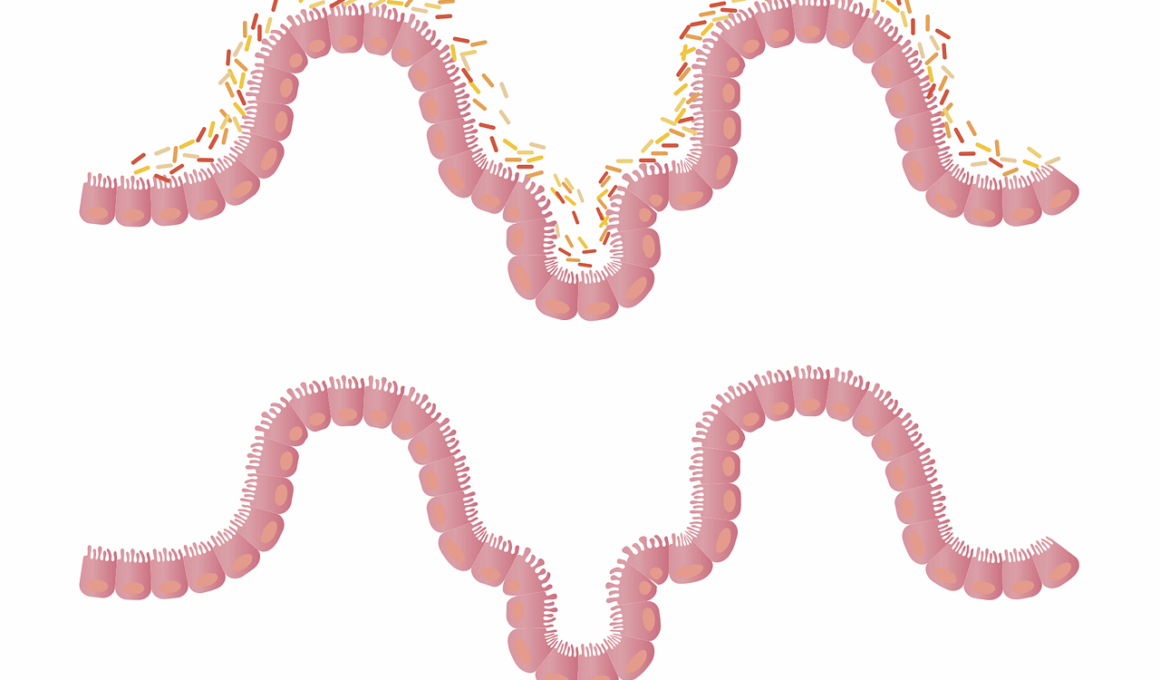How Fad Diets Affect Gut Health and Digestion
Fad diets have surged in popularity, often promising rapid weight loss and transformative health benefits. However, many of these diets severely restrict essential nutrients, leading to long-term health problems, particularly concerning gut health. For instance, diets that eliminate entire food groups can disrupt the balance of gut microbiota, which is essential for optimal digestion. The gut microbiome thrives on diversity, and limiting food intake can compromise microbial diversity, leading to digestive issues. People may not realize that the digestive system operates best with a varied diet that includes fibers, vitamins, and minerals from many sources. Increased reliance on processed, low-nutrient foods often associated with fad diets can also contribute to adverse gut health outcomes. Moreover, transitioning back to standard eating patterns after strict dieting can lead to binge-eating episodes, further exacerbating gut imbalances. It’s crucial to understand that sustainable long-term changes in diet are more beneficial than quick fixes. Balancing meals with proper nutrients is crucial for maintaining a healthy gut and ensuring effective digestion. Relying on fad diets can ultimately lead to more harm than good, emphasizing the importance of informed dietary choices.
One major concern surrounding fad diets relates to their potential to cause deficiencies in essential nutrients. The drastic restriction of calories and food types often deprives individuals of vital vitamins and minerals. For instance, popular low-carb diets might omit fruits and legumes, leading to insufficient fiber intake. This directly impacts gastrointestinal health, potentially causing constipation or other bowel issues. The gut flora, affected by diets low in prebiotics, struggles to thrive, showcasing the necessity for a balanced approach to nutrition. Moreover, eliminating entire food groups can lead to obsessive behavior around food. This unhealthy relationship can disrupt digestive processes, as stress and anxiety around eating contribute to gastrointestinal disorders. It’s essential to emphasize that a diverse diet not only supports gut health but also benefits overall well-being. Health should not be compromised for rapid weight loss. Furthermore, fad diets frequently result in short-term weight loss rather than sustainable changes. This discouragement can lead to repeated cycles of dieting, commonly referred to as yo-yo dieting, significantly more detrimental. The psychological toll associated with these diets can harm mental health, which is crucial for maintaining healthy digestion.
The Role of Gut Microbiota
The gut microbiota plays a pivotal role in various bodily functions, particularly digestion and metabolism. Fad diets can disrupt this intricate balance, leading to unfavorable outcomes for overall health. A healthy gut microbiome consists of trillions of microorganisms that help break down food, synthesize vitamins, and protect against pathogens. When individuals adopt restricting diets for weight loss, they often miss out on essential nutrients required by beneficial gut bacteria. Low-carbohydrate diets, for instance, can diminish sources of prebiotics that feed beneficial microorganisms. Consuming a variety of foods ensures that gut bacteria remain diverse, adaptable, and effective. Studies suggest that a diverse gut microbiome can improve metabolism, enhance digestion, and reduce the risk of chronic illnesses. The repercussions of fad dieting may thus extend beyond surface-level weight control to long-term health deficits related to gut health. Furthermore, the gut-brain axis means poor gut health can also impact mental well-being, creating a concerning interplay between dieting practices and overall health. Individuals should focus on balancing their diets rather than following the latest trends to maintain a robust microbiota and promote digestive health.
In addition to nutrient deficiencies, fad diets can lead to gastrointestinal distress in some individuals. Many such diets incorporate low-calorie meal replacement shakes or bars that lead to inadequate overall nutrient intake. Over time, individuals may experience numerous digestive symptoms, including bloating, gas, and stomach discomfort. These reactions often stem from the sudden shift in dietary habits, where the gut microbiome struggles to adapt quickly to new kinds of foods or lacks sufficient fiber. Besides, the reliance on highly processed foods often found in fad diets can introduce unwholesome additives. These can further trigger inflammatory responses in the gut, exacerbating symptoms of discomfort. Continually provoking the gut with non-digestible ingredients can lead to long-term issues, such as leaky gut syndrome or IBS, that require extensive intervention to resolve. Moreover, psychological components should not be discounted, as high-stress levels stemming from strict diet regimes can lead to digestive issues. Therefore, cultivating a healthy relationship with food is crucial when making nutritional choices rather than succumbing to fad diets that promote unhealthy behaviors.
Sustainable, Long-Term Solutions
To counteract the negative implications of fad diets, adopting a sustainable, balanced approach to nutrition is essential. Focus on incorporating whole foods, such as fruits, vegetables, lean proteins, and whole grains, which provide essential nutrients and promote gut health. Such foods support the growth of beneficial gut bacteria while helping to regulate digestion and metabolism. Making conscious choices to combine various food types fosters nutrient diversity, pivotal for maintaining a healthy microbiome. Instead of depriving the body, aim to create a diet that satisfies hunger while providing the body with necessary fuel. Slow, mindful changes rather than extreme measures help promote sustainable weight management and improved digestion. Moreover, prioritizing fiber through legumes, whole grains, and vegetables can enhance gut health significantly. Hydration also plays a key role in digestion, as water intake assists in the smooth function of the digestive system. By considering individual nutritional needs and preferences, individuals can create lasting habits that enrich their lives without compromise. The guiding principle remains: moderation and diversity can sustain health while fostering gut well-being over time.
Adopting habits that prioritize gut health can be deeply beneficial in the face of fad diets. Regularly consuming fermented foods, such as yogurt, kefir, sauerkraut, or kombucha, can contribute positively to gut microbiota. These foods introduce beneficial bacteria that help optimize digestive processes. Including prebiotic-rich foods like bananas, onions, and garlic provides the necessary fuel for beneficial bacteria to thrive. Along with maintaining a diverse diet, it’s equally important to heed the body’s signals while eating, as this fosters a healthy relationship with food. Slow eating and awareness can prevent overeating while promoting enjoyable meals. Additionally, supplementing with probiotics may support gut health, particularly in instances where diverse food intake is challenging. However, it’s best to consult a healthcare professional before taking supplements as they may not be suitable for everyone. Focus on integrating nutrient-dense meals and snacks that align with personal preferences for overall health. The journey towards better gut health may require time and patience, but the positive impacts on digestion and overall wellness are profoundly rewarding in the long run.
Conclusion
In conclusion, while fad diets may offer temporary weight loss, the long-term effects on gut health and digestion can be detrimental. Nutrient deficiencies, poor microbiota balance, and gastrointestinal distress are common pitfalls associated with these restrictive diets. Emphasizing the crucial role of a diverse, well-balanced diet provides a clearer path to sustainable health and wellness. Encouraging individuals to prioritize nutrient-rich foods while avoiding fads can lead to substantial positive outcomes for gut health. Because our intestines play an integral role in digestion, immune responses, and overall wellbeing, maintaining their health should not be taken lightly. Educating ourselves on the benefits of varied diets can be transformative, allowing for healthier choices that promote lasting well-being. Sustaining a mindful approach to eating, coupled with informed choices, will lead to a flourishing gut, necessary for overall physical health. Ultimately, embracing moderation, variety, and culinary enjoyment fosters more than just healthy digestion—it cultivates a lifestyle that supports both personal satisfaction and health for years to come.
In the journey of understanding fad diets and their impact on gut health, knowledge is your best ally. Being informed enables confident decision-making around dietary choices, ensuring they promote long-term wellness. Individuals are encouraged to consult with registered dietitians and professionals, bridging gaps in nutrition knowledge and fostering healthier eating habits. Whether looking to improve gut health or embark on a weight-loss journey, ensuring dietary choices are rooted in evidence-based practices is vital. Personalization must guide dietary decisions, allowing individuals to embrace foods that resonate with their personal tastes while fulfilling nutritional needs. Ultimately, by seeking balanced diets over fleeting trends, individuals can achieve their health goals sustainably while cherishing their overall wellness. A deeper appreciation for nutrition and its effects empowers individuals to navigate their dietary journeys adeptly. Building a robust relationship with food ensures that each meal contributes positively to health, well-being, and enjoyment. Recognizing that lasting changes in diet can promote not just gut health but a brighter future also holds significance. Choosing wisely, approaching nutrition holistically will lead to transformative experiences in cultivating health and happiness.


